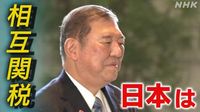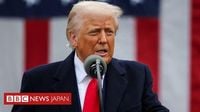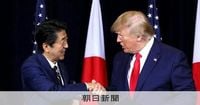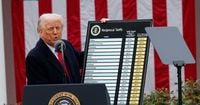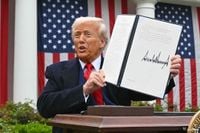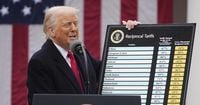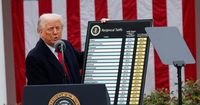On April 2, 2025, U.S. President Donald Trump announced the imposition of reciprocal tariffs on imports from various trading partners, including Japan, during a press conference held in the Rose Garden of the White House. This new trade policy introduces a flat 10% basic tariff on all imports, with additional tariffs imposed based on the existing tariffs and non-tariff barriers of each country. Japan will face a total tariff of 24%, while the European Union (EU) will see a 20% tariff, and China will face a staggering 54% after an additional 34% is added to the current 20% tariff.
Trump characterized this move as an "economic declaration of independence," asserting that for decades, the United States has been exploited by both allies and adversaries alike. He stated, "Today is the day of U.S. liberation. We are finally putting America first," emphasizing the need to address the trade imbalance that has burdened the U.S. economy.
The tariffs are set to take effect on April 5, 2025, for the basic 10%, while the country-specific increases will be implemented on April 9, 2025, targeting approximately 60 countries. According to White House officials, this policy aims to bolster domestic manufacturing employment and counter the hollowing out of U.S. industries.
Fitch Ratings' U.S. survey officer, Orl Sonara, warned that the implementation of these tariffs would increase the effective import tax rate in the U.S. from 2.5% in 2024 to a staggering 22% by 2025. He cautioned that such a dramatic rise in tariffs could lead to significant upheaval in both the U.S. and global economies, with many countries likely to fall into recession.
In response to the announcement, various trading partners are expected to retaliate. Secretary of the Treasury Bessen urged countries not to escalate the situation, stating on CNN, "Retaliation will only lead to further escalation. Hasty actions are not wise." Following Trump's announcement, U.S. stock futures dropped sharply, reflecting concerns over the potential economic fallout. Since mid-February, approximately $5 trillion in market value has been lost.
Italian Prime Minister Giorgia Meloni expressed a commitment to negotiating with the U.S. to avoid a trade war, stating that such a conflict would weaken Western nations and benefit other global players. Meanwhile, China's Ministry of Commerce responded by demanding the immediate withdrawal of unilateral tariff measures, asserting that China would take necessary countermeasures to protect its rights and interests.
Trump's high-tariff policy has prompted criticism from various sectors. Economist Paul Krugman labeled the reciprocal tariffs as "completely crazy," highlighting the potential for a trade war that could disrupt global economic stability. In the U.S. Congress, Representative Gregory Meeks, the top Democrat on the House Foreign Affairs Committee, announced intentions to introduce legislation to repeal the tariffs, although the likelihood of passage in the Republican-controlled Congress is slim. Meeks criticized the tariffs as the largest regressive tax in modern history, asserting that they would disproportionately harm working families.
Turning to Japan specifically, Trump expressed dissatisfaction with the trade imbalance, recalling past interactions with former Prime Minister Shinzo Abe. Trump noted that while Toyota sells one million cars in the U.S., the U.S. only imposes a 2.5% tariff on imported passenger cars, contrasting that with the EU's tariffs of over 10% and India's 70%. He reiterated that non-tariff barriers imposed by Japan and South Korea complicate trade relations.
In Japan, reaction to the tariffs has been swift. General Affairs Minister Ishikura convened a meeting with senior officials from the Foreign Ministry, the Ministry of Economy, Trade and Industry (METI), and the Finance Ministry to discuss the implications of the tariffs and determine a response strategy. The Japanese government is reportedly seeking to exclude Japan from the tariff measures and is examining the potential impact on domestic industries and employment.
As the world watches closely, analysts are predicting that Trump's aggressive trade policies could lead to inflationary pressures and a slowdown in economic growth. Ken Rogoff, the former chief economist at the International Monetary Fund (IMF), remarked, "He has just dropped a nuclear bomb on the international trade system," indicating the gravity of the situation.
In summary, as the U.S. embarks on this new trade strategy, the implications for both domestic and global markets remain uncertain. The potential for retaliation from trading partners raises concerns about escalating tensions and the risk of a full-blown trade war, which could have far-reaching consequences for economies worldwide.
